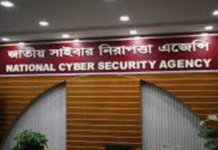
The protesting students for quota system reforms in government jobs on Sunday gave a memorandum to president Mohammed Shahabuddin while issuing a fresh, 24-hour ultimatum for the government to accept their one-point demand.
The students demanded that 95 per cent of jobs be awarded based on merit and five per cent quotas be reserved for members of ethnic minority communities, children of freedom fighters, and persons with disabilities by enacting a law in parliament.
The government, however, said that it had nothing to do with the issue unless a solution came from the court.
The High Court, in its full verdict over a petition on the government service quota case, observed on Sunday that the government authorities ‘may take necessary step by framing rules/guidelines to ensure participation of backward sections of the citizen in the recruitmen process of the government.’
The HC published its 27-page verdict days after the Appellate Division, on July 10, asked the government authorities to maintain the status quo for four weeks concerning the enforcement of the quota system.
A 12-member delegation of the Students Movement Against Discrimination, a platform for anti-quota protesters, including its coordinators Nahid Islam and Sarjis Alam, went to Bangabhaban to submit the memorandum.
They submitted the memorandum to the president’s military secretary, Major General Mohammad Adil Chowdhury, at about 2:30pm.
Addressing a rally in front of the Gulistan Shopping Complex after submitting the memorandum to the president, Nahid said they would wait 24 hours for the president and the government to take a visible step regarding their demand.
‘We went to the president because we did not get any assurances from the government. We hope that he will play a role in enacting a law in the parliament, and he will call an emergency session in the parliament if necessary,’ said Nahid.
He said that the government was planning to suppress the protestors but could not stop the procession on Sunday as well.
‘We do not want to announce tough programmes that will cause public suffering. We will announce our next programme after observing the move, the president and government authorities concerned, in the next 24 hours,’ said Nahid.
Nahid also announced an ultimatum for a similar duration for the police to withdraw a case filed against them at Shahbagh police station.
The protesters blocked the road in front of the Gulistan Shopping Complex at about 1:45pm and left the place at 3:20pm after holding a short rally.
Later in the afternoon, speaking at a press conference at her official residence, Ganabhaban, prime minister Sheikh Hasina said that a solution to this issue must come from the court. ‘They [the protestors] have to accept reality. We have nothing to do,’ she said.
‘Law will take its own course if the protesters launch attacks on police and vandalise vehicles,’ Hasina added.
Several thousand protesting students from different educational institutions brought out a rally from the Dhaka University central library around noon and reached and marched to Bangabhaban, breaking police barricades near the High Court and Zero Point at Gulistan.
They staged a sit-in programme in the Gulistan area, halting vehicular movement. Commuters suffered as traffic was blocked, and some traders closed their shops, sensing trouble.
The students also chanted slogans, rendered revolutionary songs, and recited poems during their sit-in.
Students in other districts across the country, including Rajshahi, Pabna, and Sylhet, presented the same memorandum to the president through the deputy commissioners, bringing out mass processions, New Age correspondents reported.
Hundreds of teachers and students of Jahangirnagar University demonstrated on the campus on Sunday, protesting the police case against the students and the police attack on quota reformation movement protesters, New Age correspondent in JU reported.
At about 11:00am, students brought out a procession from the university’s central library premises and held a rally near the Dhaka-Aricha highway at the main entrance of the university.
The police filed a case against ‘unidentified students’ of anti-quota protests on the charges of assaulting on-duty police members and vandalising their vehicles during their Thursday’s Shahbagh blockade.
Razarbagh police lines transport driver Khalilur Rahman filed the case with the Shahbagh police on Friday after consulting his higher authorities, according to the case statement.
Addressing reporters at an event at Shilpakala Academy on Sunday, home minister Asaduzzaman Khan said that the case filed against quota protesters could be dismissed if it lacked merit.
‘Anyone can file a lawsuit if aggrieved. If the investigation reveals no merit to the case, it can be automatically cancelled, regardless of whether it takes 24 hours or 24 days,’ said the minister responding to a question from a journalist.
Leaders of national minority communities demanded on Sunday the reinstatement of a five per cent quota for them in government service.
At a press conference at Madhu’s Canteen at Dhaka University, they also demanded identifying more marginalised and backward groups among the national minority communities to ensure their benefit.
On October 4, 2018, the government issued a circular abolishing all 56 per cent quotas—30 per cent for freedom fighters’ descendants; 10 per cent for women; 10 per cent for people from underdeveloped districts; 5 per cent for ethnic communities; and 1 per cent for physically challenged people—in the public service from Grade 9 to 13, following student protests.
New Age









